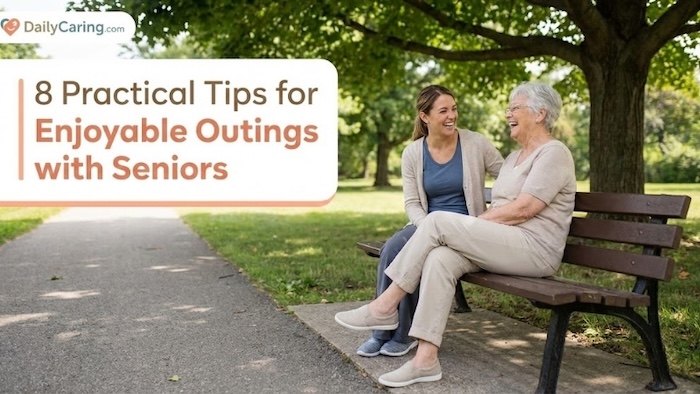Taking seniors on a fun outing can seem like a major challenge. But with advanced planning, it can be an enjoyable experience for both of you. In addition, going out more often could even boost your loved one's well-being.
Superior Senior Care shares 8 practical tips that minimize stress and increase success when taking an older adult on an outing.

Most older adults spend the majority of their time at home. It could be because they have limited mobility, prefer to spend time at home, or get anxious in new environments. Even so, it’s still possible for them to get restless and want to leave the house to do something fun once in a while.
Taking an older adult on an outing takes extra effort, but it can also benefit their overall health and well-being.
In fact, research has shown that getting out of the house more frequently might even help seniors live longer. Being out and about keeps seniors engaged with the outside world and offers more opportunities for social interaction.
Whether you’re staying close to home or venturing farther, use these 8 helpful tips for senior outings to make it a fun and successful experience.
8 Tips to Make Your Outing with an Aging Adult Fun and Successful
1. Plan an outing with special needs and preferences in mind
You’re most familiar with your loved one's limitations, preferences, and comfort levels in different situations.
Maybe they move slowly. Maybe they require certain types of seating. Maybe they dislike crowds, have trouble seeing or hearing, or can’t navigate stairs or escalators
Whatever their needs are, take them into consideration when planning the outing to minimize surprises.
Mobile apps for smartphones can also make accessibility easier. From accessible bathrooms to wheelchair-friendly sidewalks, Google search will point you to helpful apps.
2. Build in breaks and have a flexible schedule
When you’re out and about with an aging adult, the need for extra stops or breaks may come up suddenly.
That’s why a rigid schedule isn’t recommended. It can add unnecessary stress and frustration for both of you.
Instead, plan a few breaks in advance and leave time for unplanned stops. That gives flexibility and helps keep your older adult from getting overtired.
3. Choose situations where they’ll be successful
No one enjoys an outing filled with stress and uncertainty. Plan ahead to avoid situations like eating at a crowded lunch spot with a single bathroom stall or using public transportation during rush hour.
Think about how you’re going to maneuver and work together while you’re out of the house. What’s the easiest way to get them in and out of the car? How much help do they need in the restroom? How do they react to being in crowds or feeling rushed in a public place?
For example, even if an older adult can get around inside the house, they might need a wheelchair for longer distances when they’re out. If they aren’t willing to use one, plan an outing with very little walking so a wheelchair won’t be needed.
In addition, crowded spaces, loud noises, and lots of moving around will make seniors tired more quickly. Keep the atmosphere in mind as you plan the outing.
For someone with dementia, familiar activities can be comforting and more enjoyable. Try bringing your loved one to a place that reminds them of something in their past.
For example, if they loved to cook, a cooking supply store or a spice shop might be a good choice. Similarly, a former knitter might enjoy running their fingers over skeins of yarn, and a golf lover might have fun browsing the golf shop.
4. Do less than you think they can
If your loved one isn’t used to going beyond their own front door, being in an unfamiliar place can quickly become overwhelming and exhausting.
Instead of planning a full day out of the house, opt for a tea date at a local coffee shop or lunch at a quiet cafe nearby.
If an older adult enjoys the experience, slowly work your way up to spending more time out of the house.
5. Think about the climate – both outdoors and indoors
Planning ahead for weather and temperature is essential when going out with an older adult. Their bodies are less able to adapt to changes in climate.
In the winter months, that means navigating weather hazards like freezing conditions, rain, or snow. In summer, that might include sweltering heat or sudden rainstorms.
As you help them dress, choose clothing that’s best suited for the outdoor conditions and have them wear layers in case the weather changes. It’s also helpful to pack an extra pair of socks or shoes, a hat, or an oversized umbrella – they could save the day.
Think about the climate inside, too. Whether you’re dealing with stuffy central heating or blasting air conditioning, bring items that help your loved one stay comfortable – like a warm scarf, extra sweater, hand-held fan, or a cool, moist face towel.
6. Pack the necessities
As you plan the outing, think about the essentials that you’ll need to pack. That might include medication, snacks or meals, bathroom supplies, etc.
Also, think about how you’re going to carry everything. Does it all fit comfortably in a shoulder bag? If you need to be hands-free to help your loved one, would a backpack be more convenient?
Tip: Set an alarm on your mobile phone for any medical or dietary requirements that are on a strict schedule. That way, you can relax and enjoy the day without worrying about missing a dose or meal.
7. Give fidgeters something to do
Whether traveling near or far, fidgeters don’t have to leave their sensory aids behind. Bring them along.
They’ll comfort your older adult, reduce anxiety, and prevent issues caused by boredom or agitation.
8. Have an escape plan
Exhaustion. Illness. Bad weather. There are all sorts of reasons to cut your planned outing short. And “just not feeling it” is absolutely a valid reason!
Don’t feel like you’ve failed if you don’t make it through your itinerary. The goal was to get out of the house and give the outing a try. Mission accomplished!
Things may come up suddenly, but if you have a feeling that you might need to cut out early, let others know.
If you’re going out to eat with others, quietly explain your circumstances to the group. And in restaurants, servers can put a rush on food or deliver a check with your meal so you can leave when needed.
Recommended for you:
- 6 Simple Auto Aids for Seniors Make Car Travel Easier
- 6 Tips for Dining Out with Seniors with Dementia
- Traveling with Dementia: 6 Ways to Know If It Will Work
Guest contributor: Susan Ashby joined the Superior Senior Care team in July of 2014 as Community Relations Manager. With over 27 years of experience in geriatric health, Susan brings a wealth of knowledge and insight to Superior Senior Care and plays an integral part in connecting consumers and communities with resources for independent living.
About the Author

Connie is the founder of DailyCaring.com and was a hands-on caregiver for her grandmother for 20 years. (Grandma made it to 101 years old!) She knows how challenging, overwhelming, and all-consuming caring for an older adult can be. She also understands the importance of support, especially in the form of practical solutions, valuable resources, and self-care tips.













